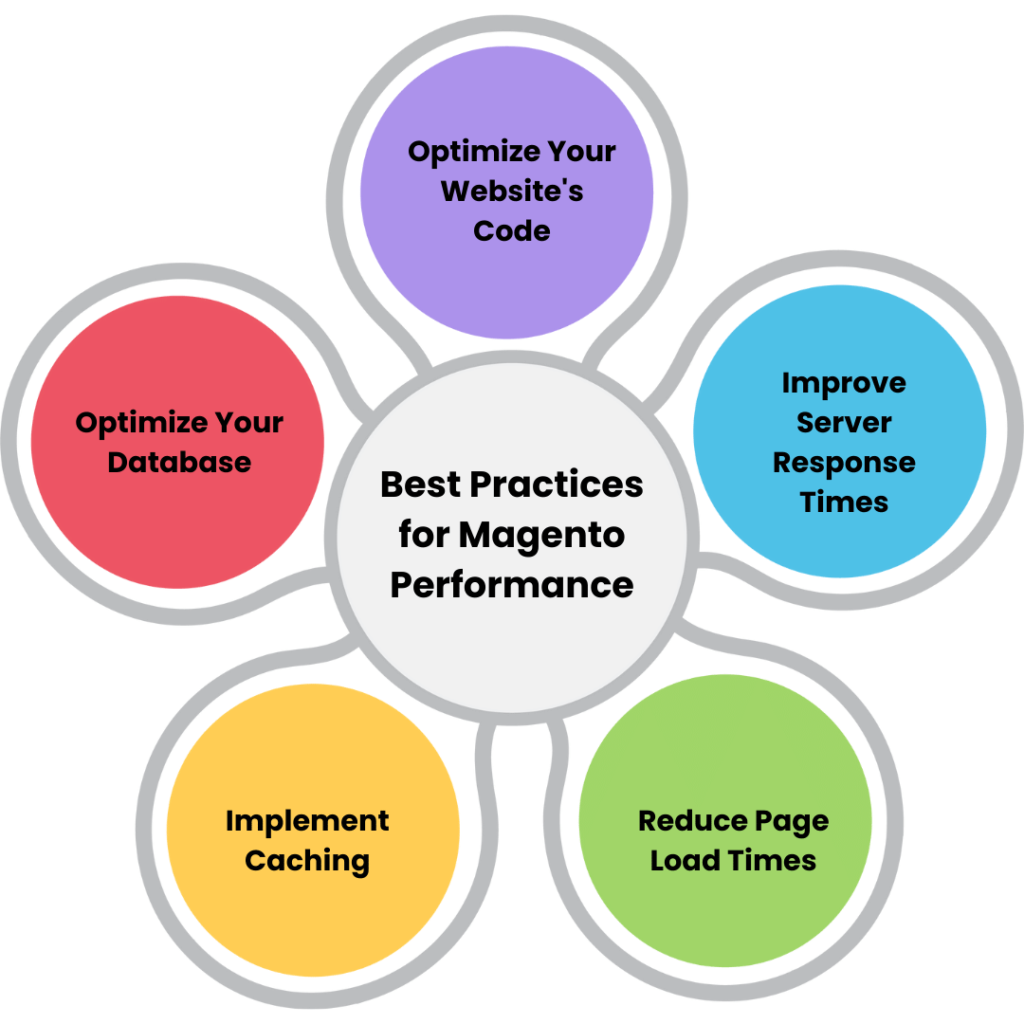Introduction
Running an online store on Magento can be a challenging task, especially when it comes to optimizing its Magento site performance. Slow page load times and sluggish website response can impact user experience, causing frustration and leading to lost sales. However, with the right approach, it is possible to optimize your Magento site speed and ensure that your store runs smoothly, quickly, and efficiently.
In this article, we will delve into a range of best practices aimed at enhancing the speed of your Magento store. Firstly, we will explore strategies for optimizing your website’s code. Additionally, we will discuss methods for improving server response times. By covering these essential aspects, we will equip you with the knowledge needed to ensure that your online store is performing at its best.
So, let’s dive in and explore the top strategies for improving Magento performance.
Best Practices for Magento site performance: Speed Up Your Store
Optimize Your Website’s Code
One of the most effective ways to improve your Magento site performance is to optimize your website’s code. This means streamlining your website’s HTML, CSS, and JavaScript to reduce file sizes and eliminate unnecessary code. This can significantly improve page load times and reduce server response times.
Here are some tips for optimizing your website’s code:
- Minimize the number of HTTP requests by combining CSS and JavaScript files
- Use a Content Delivery Network (CDN) to distribute content across multiple servers
- Reduce the size of images and optimize them for web use
- Use caching to store frequently accessed data, such as session information, database queries, and web pages
- Minimize the use of third-party extensions and plugins, as they can slow down your website
By optimizing your website’s code, you can significantly improve your Magento performance and provide a better user experience for your customers.
Improve Server Response Times for better Magento site performance
Another critical factor that affects Magento performance is server response times. Slow server response times can lead to long page load times, which can negatively impact user experience and result in lost sales. Therefore, it is essential to ensure that your server response times are as fast as possible.
Here are some tips for improving server response times:
- Choose a high-quality web hosting provider that specializes in Magento hosting
- Use a Content Delivery Network (CDN) to distribute content across multiple servers
- Optimize your server settings, including PHP memory limits, caching, and compression
- Use a reverse proxy or load balancer to distribute traffic across multiple servers
- Monitor your server performance regularly to identify and fix any issues that may impact Magento performance
By improving your server response times, you can significantly improve your Magento performance and provide a better user experience for your customers.
 Reduce Page Load Times
Reduce Page Load Times
Page load times are another critical factor that affects Magento site speed. Slow page load times can lead to higher bounce rates, increased cart abandonment rates, and lower conversion rates. Therefore, it is essential to ensure that your page load times are as fast as possible.
Here are some tips for reducing page load times:
- Optimize your website’s code, as mentioned in the first point
- Minimize the number of HTTP requests by combining CSS and JavaScript files
- Use lazy loading to defer the loading of non-critical resources until they are needed
- Optimize your website’s images by compressing them and reducing their file size
- Use a Content Delivery Network (CDN) to distribute content across multiple servers
- Enable HTTP compression to reduce the size of data sent from the server to the client
By reducing your page load times, you can significantly improve your Magento performance and provide a better user experience for your customers.
Implement Caching
Caching is an effective way to improve Magento performance by storing frequently accessed data in a cache rather than fetching it from the database or the server. This can significantly reduce server response times and page load times, as well as improve overall website performance.
There are several types of caching that you can implement in Magento, including:
Full Page Caching:
This type of caching stores the entire page output in the cache, allowing it to be served directly from the cache for subsequent requests.
Block Caching:
This type of cache stores specific blocks of content in the cache, allowing them to be served directly from the cache for subsequent requests.
Database Caching:
This particular cache type stores commonly accessed database queries along with their results in the cache. As a result, subsequent requests can directly retrieve the information from the cache, eliminating the need for repeated querying of the database.
Implementing caching in Magento can be done through various methods, such as using Magento’s built-in caching mechanisms or third-party caching solutions. Some of the benefits of using caching in Magento include:
- Improved page load times
- Reduced server load and response times
- Improved website performance and scalability
- Enhanced user experience and customer satisfaction
However, it’s important to note that caching can also have some drawbacks, such as increased complexity and potential caching errors. Therefore, it’s important to thoroughly test your caching implementation and monitor its performance to ensure that it’s working effectively.
Caching is an essential tool for improving Magento performance and providing a better user experience for your customers. By implementing caching, you can significantly reduce page load times and server response times, as well as improve overall website performance and scalability.
5. Optimize Your Database
The database is a critical component of any Magento store and optimizing it can have a significant impact on Magento performance. A poorly optimized database can lead to slow page load times, server response times, and overall website performance. Therefore, it is essential to ensure that your database is optimized for maximum performance.
Here are some tips for optimizing your database:
- Regularly clean up your database by removing unnecessary data
- Use indexes to speed up database queries
- Use a separate database server for read-heavy operations
- Optimize your MySQL settings, including buffer size, cache size, and timeouts
By optimizing your database, you can significantly improve your Magento performance and provide a better user experience for your customers.
FAQs about Magento Performance
Why is Magento performance important for my online store?
Magento performance is critical for your online store because it directly impacts user experience. Slow page load times, sluggish website response, and other performance issues can lead to lost sales, higher bounce rates, and increased cart abandonment rates. Therefore, it is essential to ensure that your Magento store is performing at its best to provide a better user experience for your customers.
How can I monitor my Magento performance?
Various tools are at your disposal for monitoring the performance of your Magento site, such as New Relic, GTmetrix, and Pingdom. Leveraging these tools enables you to pinpoint performance bottlenecks, evaluate server response times, analyze page load times, and assess other essential metrics that significantly impact Magento’s overall performance.
Can I improve my Magento performance on my own, or do I need a developer?
While some Magento performance optimizations can be done by non-technical users, others require advanced technical skills and expertise. Therefore, it is recommended to work with a developer or a Magento optimization expert to ensure that your store is performing at its best.
Conclusion
Optimizing Magento site performance is essential for any online store to provide a better user experience and increase sales. By implementing the best practices, we have discussed in this article, you can significantly improve your Magento site speed, reduce page load times, and provide a better user experience for your customers.
Remember, Magento performance is not a one-time task, but an ongoing process that requires regular monitoring and optimization. By regularly monitoring your website’s performance, you can identify and fix any issues that may impact Magento performance and ensure that your store is running smoothly, quickly, and efficiently.
So, start implementing these best practices today and take your Magento performance to the next level!
Learn How to Optimize Your Magento Store for Mobile Devices for better site speed here







